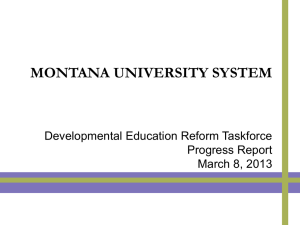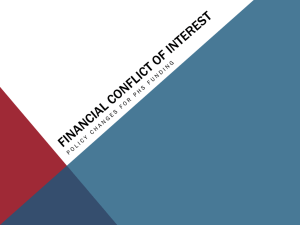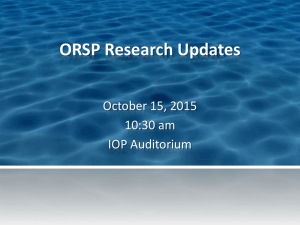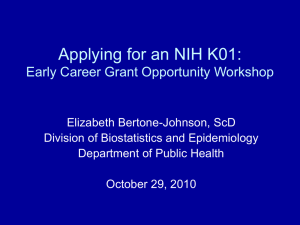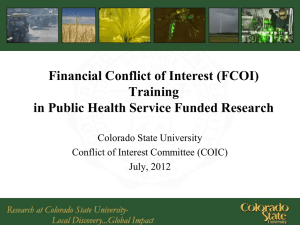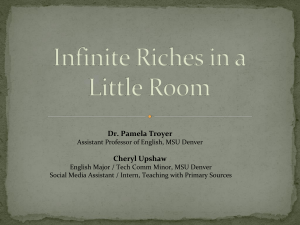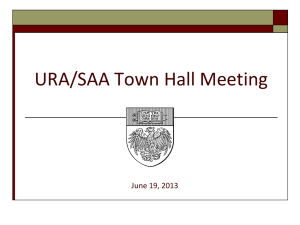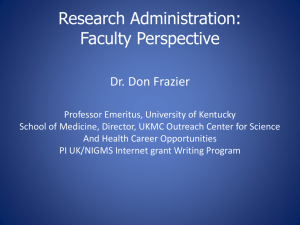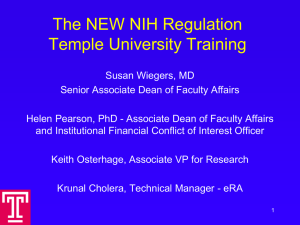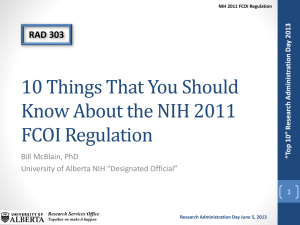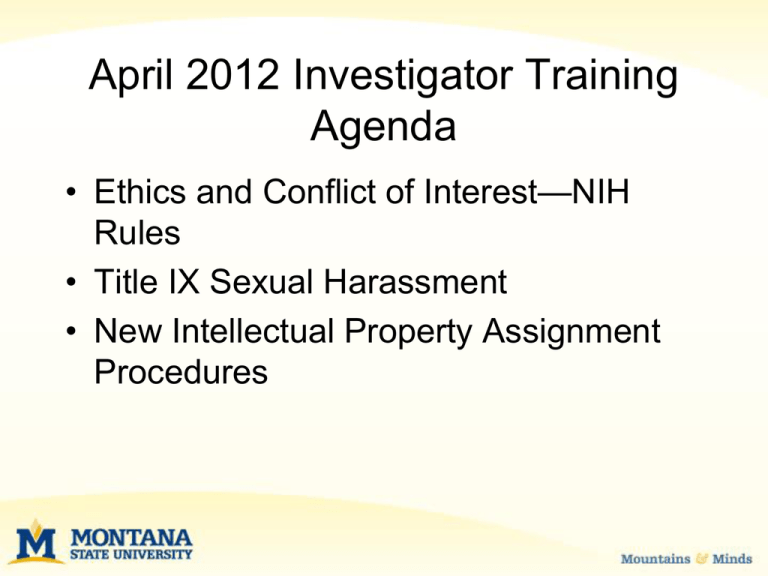
April 2012 Investigator Training
Agenda
• Ethics and Conflict of Interest—NIH
Rules
• Title IX Sexual Harassment
• New Intellectual Property Assignment
Procedures
ETHICS AND CONFLICT OF
INTEREST CHANGES AND
NEW PHS-NIH RULES
Montana State University
Researcher Update 2012
Pam Merrell, Assoc. Legal Counsel
OVERVIEW
• Montana Ethics Statutes—a Refresher
• MSU Conflict of Interest Policy
– Refresher
– Revisions Required by new NIH
Regulations
• Scenarios
• Resources
In a Nutshell—What Are We
Talking About?
• Outside Relationships or Interests
• Related to Institutional Duties and
Responsibilities
• With the Potential to Improperly Affect
or Bias Institutional Responsibilities
MONTANA STANDARDS OF
CONDUCT
(Montana Code Title 2 Ch. 2)
• Montana law prohibitions apply to all
state employees
– Gifts
– Outside interests
– Employment
– Contracts
MONTANA STANDARDS OF
CONDUCT
• Prohibited Gifts
– “substantial value” ($50 or more)
– Improperly influence a “reasonable” person
– Exceptions:
• Charitable functions
• Public awards
• Educational activity which does not create
obligation, serves the public good, and is not
“lavish”
MONTANA STANDARDS OF
CONDUCT
• Actions Prohibited RE: Outside Interests
–
–
–
–
Use of confidential info
Use of State resources
Benefit from official action
Take official action to benefit interest OR harm
competitor
– Engage in transaction with entity employee
inspects or supervises
– Assist (for fee) another to obtain contract or
other economic benefit from state employer
MONTANA STANDARDS OF
CONDUCT
• Employment Prohibitions
– Seek employment with entity regulated by
employee (without disclosure)
– Obtain employment (w/in 12 mos of term.)
with entity which takes direct advantage of
matters directly involved in as a state
employee (involuntary termination
excepted)
MONTANA STANDARDS OF
CONDUCT
• Contract Prohibitions
– No interest in contracts made by employee for
state
– W/in 6 mos of termination, may not contract with
state or be employed by state contractor involving
matters “directly involved” in during employment
– Exception—Only for MUS—BOR Policy §407
• Inventor with employment, ownership or officer, or
director role in Co. w/contract with MSU (e.g. technology
license) may do so with BOR approval
Board of Regents § 407
• Inventor or Creator of IP for MSU
• Employee, Owner, Director, Officer
• OF “Entity” which has (or is negotiating
to have)
• Contract with MSU re: research,
development, commercialization of the
IP
MSU COI POLICY
• Tone—Recognizes Potential COI’s will
occur
– Not BAD Per Se—Disclose, Evaluate, and
Manage When Possible
• Definitions
– Conflict of Interest
– Significant Financial Interest
• DISCLOSURE
MSU COI POLICY
• Policy Statement
– MSU to be free of undue influence or bias
that may result from conflicts of interest
• Conflict of Interest
– Personal (including financial) interest
inconsistent or incompatible with
employees duties and obligations
– Independent observer rule
NEW PUBLIC HEALTH
SERVICE (NIH) RULES
• Grantees required to adopt COI policies
consistent with new rules
• Implemented by August 24, 2012
• MSU Revised Policy for Comment at:
http://www.montana.edu/legalcounsel/pr
oposedPolicies.html
• Training required—NIH research
SUMMARY OF CHANGES
PHS-NIH RULES
• Reporting Thresholds Lowered
• Reporting Broadened to Relationship to
any Institutional Responsibilities
• New Reporting of Sponsored Travel for
NIH Researchers
• Public Disclosure Requirements
DISCLOSURE—
KEY TO POLICY
MSU COI POLICY (Revised
2012)
• Significant Financial Interest (SFI) NEW
Anything of monetary value (e.g., salary,
stocks, stock options, consulting fees,
royalties, etc.)
– $5K/yr Income (aggregated w/spouse &
children) in previous 12 months—WAS $10 K
– $5K value of public company equity—WAS
5% ANY ownership of non-public company—
WAS 5%
MSU COI Policy (Revised
2012)
• SFI EXCLUDES:
– Income from MSU (salary, royalties, etc.)
– Royalties received from IP assigned to MSU
– Income from seminars, lectures, or teaching engagements
sponsored by governments, higher ed, medical centers or
research institutions affiliated with higher ed (NEW—
removes nonprofits)
– Income from advisory committees or review panels for
governments, higher ed, medical centers or research
institutions affiliated with higher ed (NEW—removes
nonprofits)
– Investment in, e.g., mutual funds or the like with no
investment decision control
– Interest in Phase I SBIR/STTR entity (FOR NIH
REPORTING only)
DISCLOSURE REQUIRED OF
ALL COVERED EMPLOYEES
• What must be disclosed (All covered
employees)?
– SFI in entity directly related to MSU duties
and responsibilities
– Officer or Director in entity directly related
to MSU duties and responsibilities
– Immediate family member – with above
interest
• Spouse and dependent children
DISCLOSURE REQUIRED OF
ALL COVERED EMPLOYEES
• What (continued)
– Outside interest related to an MSU purchase or sale
when employee is involved
– Planned participation in an MSU decision which would
benefit or harm:
• Relative (MSU nepotism policy)
• Person in whom employee has a financial interest
• Person with whom employee has a consensual
romantic relationship
– Catchall—Any personal or financial interest
which creates a potential COI
DISCLOSURE REQUIRED OF
ALL COVERED EMPLOYEES
• When is disclosure made?
– Whenever a potentially conflicting interest
is acquired
– Annually for all employees EXCEPT:
• Less than .5 FTE
• Classified
RESEARCHER DISCLOSURE
(Revised 2012)
• Sponsored Research—definitions:
• INVESTIGATORS—Anyone responsible for the
DESIGN, CONDUCT, or REPORTING of
Research
• NEW—INVESTIGATOR INSTITUTIONAL
RESPONSIBILITIES—research, teaching,
service, institutional committee membership,
etc.
RESEARCHER DISCLOSURES
(Revised)
• NEW—All Sponsored Research
INVESTIGATORS must disclose:
– SFIs “that would reasonably appear to be
related to INVESTIGATOR’S
INSTITUTIONAL RESPONSIBILITIES”
• Old definition: SFIs related to sponsored
research
• Must describe “relationship” to responsibilities
and research
RESEARCHER DISCLOSURES
(Revised)
• NEW—PHS (NIH) Sponsored Research
INVESTIGATORS must disclose:
– Reimbursed or Sponsored Travel related to
INSTITUTIONAL RESPONSIBILITIES
• Travel paid on behalf of the Investigator—
directly or through reimbursement
• Exempt: paid by government, institutions of
higher ed, academic hospitals, medical centers,
or research institutes affiliated with higher ed
RESEARCHER DISCLOSURES
(Revised 2012)
• Reimbursed or Sponsored Travel
Disclosure continued (NEW):
– Must disclose:
•
•
•
•
•
Purpose
Identity of sponsor
Destination
Duration of travel
Relationship to Institutional Responsibilities and to
NIH sponsored research
• More (including $$) if requested
RESEARCHER DISCLOSURES
(Revised 2012)
• WHEN
– Proposal Clearance Form
– Anytime acquired during research (w/in 30
days)
– Annually
– Reimbursed or Sponsored Travel—at PCF
previous 12 mos AND 30 days from travel
during project
• Travel Form to be revised
Annual Disclosure
• All employees EXCEPT: less than part-time
and classified
• October—electronic submission
• Disclosure Form—alternatives:
– Nothing to disclose
– Already disclosed—nothing new
– Disclosure with details of potentially
conflicting interest
DISCLOSURE (REVISED
2012)
• Evaluation of Sponsored Researcher
Disclosures
– Submitted to Office of Legal Counsel AND OSP with input from
Researcher and Supervisor
• Two Step Analysis—NEW
– Related to NIH research: Could Interest be affected by the research or
could research be affected by the interest? IF SO, THEN:
– Is it an FCOI: Could Interest DIRECTLY and SIGNIFICANTLY affect the
design, conduct, or reporting of the NIH-Funded research? If Yes:
FCOI
• Disposition: Management, Elimination,
Reduction
– Formal, Written Determinations and Plans
– If NIH Funded—Reporting to NIH
DISCLOSURE
• Public Disclosures of SFIs Required for:
– Senior Key Personnel (PI, Project Director)
on NIH-funded research which has:
• a Financial Conflict of Interest related to NIHfunded research
– Must be provided to public within five
business days of a request
• Details of SFI, e.g., name, name of entity,
range of dollar value and nature of interest
DISCLOSURE
• Evaluation of non-research disclosures
– Submitted to supervisor and Legal Counsel
– Does interest conflict with MSU responsibilities
• Disposition of non-research disclosures
–
–
–
–
–
No Conflict
Waiver
Management
Elimination
Formal, Written Determinations and Plans
MANAGING CONFLICTS
• Management Options
– Public Disclosure in publications,
presentations etc.
– Oversight re: potential bias of research
– Modification of research plan
– Modification of researcher responsibilities
– Protection of: students, MSU IP, etc.
• Reduction or Elimination
SCENARIO 1
• Post Doc proposed to perform
experiments designed by PI on NIHfunded project concerning norovirus—
spouse works full-time for Ligocyte
– Investigator? Reportable?
– Related to NIH research?
– Directly and Significantly affect NIH
research: FCOI? Reportable to NIH?
– Manageable? How?
SCENARIO 2
• Project Director Determined to have a
FCOI reportable to NIH
– Requestor asks for information about this
FCOI
– Must it be provided to requestor?
– What if the request is for information
concerning an Investigator who is not a PI
nor Project Director?
SCENARIO 3
• Software vendor holds annual conference for
users. Research professional (user) (NIH
funded) invited to conference, all expenses
paid
– Reportable? Related to institutional responsibilities?
– When?
– Researcher is involved in purchasing decision for new
software for NIH project and conference vendor is 1 of 3
vendors? Related to NIH research? FCOI--(Directly and
Significantly)
SCENARIO 4
• Investigator has an equity interest in a
start-up company which is applying for
SBIR Phase I money and will be an
Investigator under a subgrant for MSU
– Is this a “SFI”? For MSU purposes?
– Would it need to be reported to NIH?
SCENARIO 5
• Investigator’s spouse owns a cattle ranch in
Paradise Valley
• Investigator is proposed researcher under NIH
grant related to Brucellosis vaccine
– SFI?
– Related to Institutional Responsibilities? I.e.,
Brucellosis research?
– Related to NIH research: Could the cattle ranch be
affected by the NIH research?
– Is it FCOI: Could the interest DIRECTLY and
SIGNFICANTLY affect the NIH research?
SCENARIO 6
• Investigator on NIH biochemistry research
invited to attend conference sponsored by the
National Biochemical Association—all
expenses paid
–
–
–
–
–
Reportable to MSU?
When?
How?
Related to NIH research?
Financial Conflict of Interest?
• What if conference sponsored by Johns
Hopkins University?
SCENARIO 7
• MSU Investigator on NIH funded viral vaccine work attends
academic conference to present research
• Drug Company interested in the MSU vaccine license hosts a
rubber chicken dinner for all participants (200)
– Reportable?
• Same Drug Company hosts MSU Investigator and three others
for a day of golf at nearby golf club and posh dinner (value
$1000)
– Reportable? When? How?
– Related to NIH research? Could it affect the NIH research?
– Could it directly and significantly affect design, conduct, or
reporting of NIH research?
– Reportable to NIH?
SCENARIO 8
• Investigator owns $5000 worth of stock in
Lockheed Martin—Does NASA research
under LM subcontract
– Reportable? Related to his Institutional
Responsibilities?
– Related to his NASA research? Affect
research or research affect LM?
– FCOI—Could interest Directly and
Significantly affect research?
• What if owned in Mutual Fund?
TRAINING
• Required of all Investigators before
performing NIH sponsored research
(Effective August 24, 2012)
• All new NIH researchers must be
trained
• Every four years must receive training
FAILURE TO DISCLOSE—NIH
RESEARCH
• If MSU discovers an Investigator on NIH
research has failed to disclose as
required by MSU policy or to follow a
management plan, MSU must conduct a
retrospective review to determine if
there was any bias resulting from the
non-compliance.
• If bias found, report to NIH and action
RESOURCES
• Office of Legal Counsel
994-4570—Pam Merrell or Leslie Taylor
• MSU COI Proposed Revised Policy
http://www.montana.edu/legalcounsel/proposedP
olicies.html
• NIH FAQs concerning new COI regulations
http://grants.nih.gov/grants/policy/coi/coi_faqs.ht
m#3221
• BOR COI Policy website
http://mus.edu/borpol/bor700/770.htm
RESOURCES
• Montana Code of Conduct
http://data.opi.state.mt.us/bills/mca_toc/2_2_1
.htm
• MSU Nepotism Policy
http://www2.montana.edu/policy/personnel/pe
r400.html#430.00
• MSU Consulting Policy
http://www.montana.edu/wwwprov/agreement
s/tenure/art16.html
Title IX
Sex Discrimination on Campus
New Developments
April, 2012
Pam Merrell
Background
• What is a Dear Colleague Letter (DCL)?
• What is the focus of this DCL?
– Student on student sexual harassment and
sexual violence
– Complainants’ rights and university
responsibilities to end conduct, prevent its
recurrence and address its effect
Title IX
• Title IX of the Educational Amendments of
1972 (Title IX), 20 U.S.C. §§1681 et seq., and
its implementing regulations, 34 C.F.R. Part
106, prohibit discrimination on the basis of sex
in education programs or activities operated by
recipients of Federal financial assistance.
• Sexual harassment of students, which includes
acts of sexual violence, is a form of sex
discrimination prohibited by Title IX.
Definitions
• Sexual violence refers to physical sexual acts
perpetrated against a person’s will or where a
person is incapable of giving consent due to the
victim’s use of drugs or alcohol. An individual also
may be unable to give consent due to an
intellectual or other disability.
• A number of different acts fall into the category of
sexual violence, including rape, sexual assault,
sexual battery, and sexual coercion. All such acts
of sexual violence are forms of sexual harassment
covered under Title IX.
Scope
• All aspects of a school’s education program
and activities
–
–
–
–
Academic
Extracurricular
Athletic
Other programs of the school on or off-campus
• Third parties in a school’s education programs
and activities.
University’s Responsibility
• If university knows or reasonably should
know about harassment that creates a hostile
environment, university must take immediate
action to eliminate the harassment, prevent its
recurrence, and address its effects.
• Universities are directed to consider effects of
off-campus conduct when evaluating whether
there is a hostile environment on campus.
Bottom Line
• Any reports of sex discrimination, harassment and particularly
acts of sexual violence must be addressed in some fashion by
the institution
• Confidentiality cannot be promised! If a report is made to you,
you must make clear that you cannot promise confidentiality and
that you have a duty to report
• You don’t OWN this situation
• Any reports of such acts to you or knowledge or reasonable
suspicion of such acts by you MUST be reported to:
TITLE IX COORDINATOR—Diane Letendre 406-994-5326
dletendre@montana.edu
Scenarios
• “Rumors” of harassing behavior (pervasive,
unwelcome sexual advances) on student trip
• Student “may have been” sexually assaulted at
student party while drunk, doesn’t really know
what happened
• You observe student is researcher’s “right
hand”; they seem very “close”—he is her
mentor and gives favored treatment in
assignments and publications
• Student “friend” tells you “in confidence” she
has been sexually assaulted by another student


